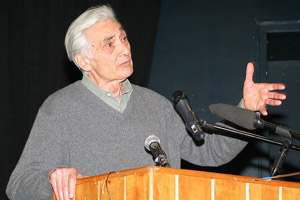
<a href="http://commons.wikimedia.org/wiki/File:Howard_Zinn.jpg">Wikimedia Commons</a> photo under CC License
Historian Howard Zinn has died at age 87. Zinn was best known for A People’s History of the United States, which turned the glossy, textbook version of American history on its head by pointing out that far from being an unbroken chain of political and economic progress, our history was one of conflict along class, racial, and gender lines. Though Zinn’s radical, bottom-up approach cast aside the America-first tone of mainstream texts, it was still guided by a deep sense of commitment to what he saw as often-neglected American ideals. As he wrote in 2004, “History, looked at under the surface, in the streets and on the farms, in GI barracks and trailer camps, in factories and offices, tells a different story. Whenever injustices have been remedied, wars halted, women and blacks and Native Americans given their due, it has been because ‘unimportant’ people spoke up, organized, protested, and brought democracy alive.” Still in print after 30 years, A People’s History has removed the scales from many an undergrad’s eyes, and has won its fair share of famous admirers, from Viggo Mortensen to Matt Damon (who name-dropped it in Good Will Hunting and just opened a stage adapation of it.) For more of Zinn’s recent writing and thinking, see this 2005 interview or his commencement address at Spelman College, where he was fired in 1963 for—amazingly—his civil rights activism.













